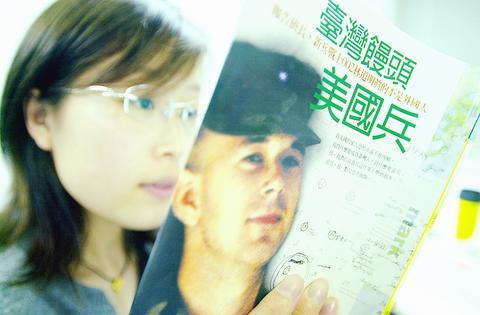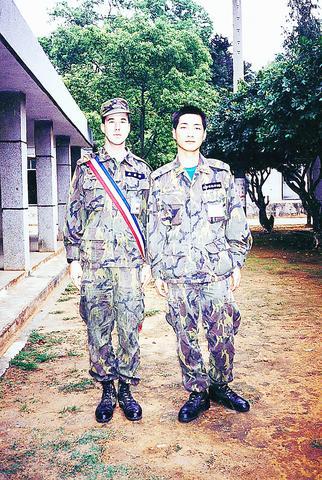For most Taiwanese men, military service is a common experience and one of the most popular topics in conversations when meeting new acquaintances or getting together with old friends.
It is not something that most foreign men in Taiwan would be able or willing to talk about -- unless that foreigner happens to be an American called T. C. Locke.

PHOTO: TAIPEI TIMES
Locke, whose Chinese name is Lin Dao-ming (

PHOTO: COURTESY OF T.C. LOCKE
Despite his obvious distinctness, Locke's experience -- as told in his recently published book, Counting Mantou: An American in the Taiwanese Army -- was much the same as that of other conscripts. In his retelling of those common experiences, Locke manages to transcend the cultural and ethnic differences, making him, in Taiwanese eyes, "one of us."
Locke was not the first naturalized foreigner to serve in the Taiwan military. What makes him different from his predecessors is that he is willing to share his experiences with the public.
In a recent interview, Locke said that he considers Taiwan as his home and that his military service here could have been "the most important part of my life."
Locke's experiences in the military are not so different from those of other conscripts who went before him. After all, life in the military does not really change that much over the years.
As a draftee, Locke first had to receive several months' basic training at a boot camp in Hsinchu. Days at the boot camp are vividly remembered by most conscripts because of constant yelling from drill sergeants who have a reputation for dishing out a steady diet of verbal abuse
At the boot camp, Locke had his first experienced with political education -- military style. The curriculum included a watching a weekly TV program and writing a short essay that would be read by his commanding officers.
Watching the weekly political education program is compulsory for service members of all ranks and is a practice which has been enforced for several decades.
The program, essentially military propaganda, runs each Thursday morning on television station CTS, which is owned and controlled by the Ministry of National Defense.
For most conscripts, including Locke, the program is very boring but still welcome because it provides a 90-minute escape from daily chores.
Writing a short essay each week is another part of the political education. The job did not seem to be difficult for Locke, since he was able to write in Chinese.
One of the essays Locke wrote at the camp was called How to Prevent Escapes from Happening. In the essay, Locke wrote that there were, of course, service members who wanted to escape. However, he wrote, if all the rules were fair and reasonable, no one would feel a compelling need to attempt an illicit escape.
The political education Locke received at the boot camp stayed with him for the rest of his service. But what he experienced after the boot camp is the part most conscripts talk about among themselves, even many years after they have been discharged.
After the boot camp, Locke was assigned to an army division in Miaoli and thus began his life as a regular soldier.
Like any other rookie soldier who reported to his unit, Locke experienced that first night what most new soldiers feared: "the shock and awe education."
This initiation ritual visited upon the newcomers by the senior soldiers has been around for many years and is almost the same from one unit to another across the three services.
On the night the rookie soldiers arrive at their posts, the senior soldiers would ask these recruits to unpack all their personal belongings for inspection and to do as many push-ups as possible.
Such practices, though technically not allowed, has been tolerated in the military since commanding officers are few in number and have to rely on senior soldiers to help keep things going.
Locke does not complain about the practice, which seems to him to be only part of the process of becoming accepted in the military.
"Military service helped me learn how to deal with things. I met both bad guys and good guys in the military," Locke said.
"I learned from the military the spirit of comradeship and cooperation," he said. "This spirit seems to be missing from people outside the military."
Another observation that Locke makes is that the Taiwan military has copied a lot from the US military, but only superficially.
"The Taiwan military is in essence still a Confucian hierarchy," he said.

Taiwan has received more than US$70 million in royalties as of the end of last year from developing the F-16V jet as countries worldwide purchase or upgrade to this popular model, government and military officials said on Saturday. Taiwan funded the development of the F-16V jet and ended up the sole investor as other countries withdrew from the program. Now the F-16V is increasingly popular and countries must pay Taiwan a percentage in royalties when they purchase new F-16V aircraft or upgrade older F-16 models. The next five years are expected to be the peak for these royalties, with Taiwan potentially earning

STAY IN YOUR LANE: As the US and Israel attack Iran, the ministry has warned China not to overstep by including Taiwanese citizens in its evacuation orders The Ministry of Foreign Affairs (MOFA) yesterday rebuked a statement by China’s embassy in Israel that it would evacuate Taiwanese holders of Chinese travel documents from Israel amid the latter’s escalating conflict with Iran. Tensions have risen across the Middle East in the wake of US and Israeli airstrikes on Iran beginning Saturday. China subsequently issued an evacuation notice for its citizens. In a news release, the Chinese embassy in Israel said holders of “Taiwan compatriot permits (台胞證)” issued to Taiwanese nationals by Chinese authorities for travel to China — could register for evacuation to Egypt. In Taipei, the ministry yesterday said Taiwan

Taiwan is awaiting official notification from the US regarding the status of the Agreement on Reciprocal Trade (ART) after the US Supreme Court ruled US President Donald Trump's global tariffs unconstitutional. Speaking to reporters before a legislative hearing today, Premier Cho Jung-tai (卓榮泰) said that Taiwan's negotiation team remains focused on ensuring that the bilateral trade deal remains intact despite the legal challenge to Trump's tariff policy. "The US has pledged to notify its trade partners once the subsequent administrative and legal processes are finalized, and that certainly includes Taiwan," Cho said when asked about opposition parties’ doubts that the ART was

If China chose to invade Taiwan tomorrow, it would only have to sever three undersea fiber-optic cable clusters to cause a data blackout, Jason Hsu (許毓仁), a senior fellow at the Hudson Institute and former Chinese Nationalist Party (KMT) legislator, told a US security panel yesterday. In a Taiwan contingency, cable disruption would be one of the earliest preinvasion actions and the signal that escalation had begun, he said, adding that Taiwan’s current cable repair capabilities are insufficient. The US-China Economic and Security Review Commission (USCC) yesterday held a hearing on US-China Competition Under the Sea, with Hsu speaking on